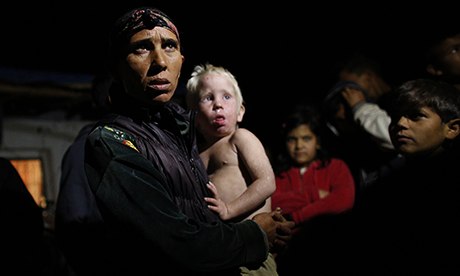October 25, 2013.
Sasha Ruseva and her son Atanas, outside her house in the town of
Nikolaevo, Bulgaria. Since this article was written, Ruseva has been
established as the biological mother of the blonde girl Maria, found
living with an unrelated Roma couple in Greece (Photograph: Stoyan
Nenov/Reuters).
If we were to make a list of reasons as to why a child should be taken into care, "being blond" would probably not make the cut. This week, however, two Roma children in Athlone and Dublin were snatched from their families for exactly that reason. In the wake of the discovery of the "blonde angel" Maria, in a Roma neighbourhood in Greece, a witch-hunt has begun. The Roma are now considered child abductors until proven innocent, with police and social services ready to pounce on any Roma parents who dare to produce a blond child. The Dublin child has already been proved by DNA to belong to her parents.Read the rest here.
Don't get me wrong, blond hair is somewhat a rarity among Roma populations. What is rarer, however, is the "pure blood" or tatcho Romany. Indeed, there is nothing more the Romany like to do than fight among themselves over who is the purest Gypsy, but one only needs to take a glance at Britain's Romany community to realise there has undoubtedly been a great deal of intermarriage. My genes would best be described as a melting pot – my mother is part Bulgarian Roma, part Romanichal (English Romany), and my dad is part Romanichal, part Irish Traveller – thus, it was hardly surprising when I was born a blue-eyed milk bottle.
The notion of the baby-snatching Gypsy is an old racist stereotype. Since I was born it has been a running joke within my family that I was stolen. My mum's engagement to a Roma man resulted in three considerably darker-skinned siblings. Among my Roma family I couldn't have stood out more, but lucky for me I can now hand down the "stolen baby" joke to my younger brother who was born with strikingly blond hair. In the current environment, however, I must ask just how funny this joke is. The implicit, and racist, message to emerge from this case is that blond hair belongs to the purer white race. While the case of little Maria in Greece seems distant, Ireland is just next door. Could my mum and stepdad be the next Roma parents to receive a knock at the door? Will my brother be the next blond Roma child to be carted off for DNA testing?
Since the case of Maria made headlines I have been adamant that it is not my place to decide the guilt or innocence of the Roma couple accused of her abduction. The alleged abductors and the Roma community in which they live have been adamant that Maria was informally adopted after being abandoned at birth. This is not entirely implausible – informal adoption and foster care is not unusual within the Romany population. I lived with my Roma grandmother for many years – there were no forms, no certificates and no paperwork, but I certainly hadn't been abducted. Indeed, it is hardly surprising that there is a reluctance to engage with state agencies when they have for so long oppressed our communities. What is more, how does the state expect a Roma family to engage with the bureaucracy of adoption when they are largely excluded from the education system?
It has become increasingly apparent that the criminal justice system in Greece is unlikely to consider the plausibility of informal adoption. The rise and influence of Golden Dawn, a far-right political party in Greece, should be a cause for concern for anyone who believes in a fair trial. Across Europe, as the Irish police have demonstrated, investigations have been fuelled by racist speculation alone. The domination of rightwing and overtly prejudiced attitudes towards Roma, not only in Greece but Europe wide, will arguably hold sway in any trial against Maria's alleged abductors. The depiction of Roma – as prolific child abductors, drug barons and inherently criminal – that has been circulated by the media does not reflect reality, but will almost certainly inform the outcome of Maria's story.
*****
Comment: If Maria had been a black child would anyone in the media have cared? I doubt whether the Greek authorities would have gone to so much trouble to highlight what is most likely a case of informal adoption.That aside, this case tells us a whole helluva lot about the value of white life (accentuated by being blond) and that of black and brown life in Europe.
For the last few days Maria has been called a "blond Angel" in articles rife with speculation about who she is and where her (white) parents may be. Hardly anyone outside the Roma community cared a lick that she may be Roma living with a family who adopted her and love her.
Instead her parents face criminal charges - some of it may even be about child trafficking. But all of it - the charges - are predicated upon a distinct racism that dogs Roma people throughout Europe.
Eleftheria Dimopoulou (L) and Christos Salis (R) insist
Maria was given to them legitimately (BBC)
We now know that Maria is the child of Roma parents in Bulgaria. And it seems that her biological mother may now be charged with child trafficking. See "Mystery girl Maria's parents found in Bulgaria by DNA" (BBC, October 25).
Do any of these folks - the authorities in Greece or Bulgaria - really care about the welfare of Maria?
My thinking is that she belongs with her adoptive parents whether the adoption was informal or not.
Onward!


No comments:
Post a Comment